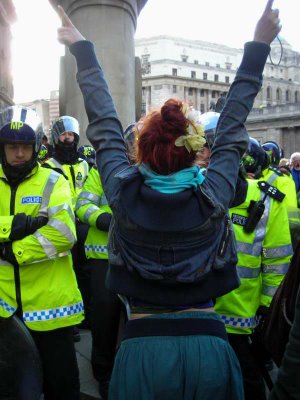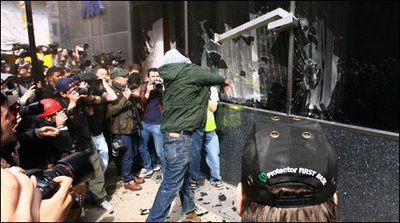Reporting according to your own biases.
According to the Guardian, this shows that Labour's strategy has closed the income gap. The Indie says that "Labour 'has cost the rich £25,000 every year'", the FT went with "Rich hit hard by 13 years of Labour budgets", while the Telegraph decided upon "10m families have lost out in Labour's tax changes", with a subtitle claiming that "Ten million middle-income households have lost out because of Gordon Brown’s repeated tax rises, a study has indicated."
Admittedly, part of the reason for why the papers are likely to have gone with such different interpretations of the same material is that while a briefing accompanied the release of the report, the report itself doesn't directly explain the graphs in any great detail, although it does point out that it doesn't show how household incomes have changed over the same time period. This is the crucial part, and only the Independent gives (unless the FT goes into more detail in its actual report rather than just the cut-off us plebs are allowed to view without paying) the extra detail concerning these changes which provide the context in which to understand the IFS report:
However, taking into account all changes in income since 1997 – including growth in salaries, bonuses, rents and investment incomes – the UK is still a very unequal society, despite the Treasury's efforts, the IFS points out. Income inequality has risen in each of the past three years and is now at its highest level since at least 1961, according to the IFS.
Sevillista in the comments on Left Foot Forward furthers this:
It is being misleadingly reported.
What it is saying that the bottom 60% are paying less tax then they would have done if 1996-97 tax structures and rates were left in place, the upper middle are paying slightly more and the very top are paying significantly more.
What it is not saying is the rich are worse of – they are far better-off and have gained far more than everyone else (inequality measured by Gini has slightly worsened, post-tax incomes
of the top 1% have raced away).Shoddy reporting. Labour in taxing rich more than Tories chose to do shock, but unable to stop inequality increasing
Newspapers in reporting the news according to their own political bias isn't perhaps the most shocking revelation, but that even the supposed serious press fails, with the exception of the Indie, to put it into actual context should be a concern to those who imagine they're being treated with anything approaching respect.
Labels: bias, Guardian-watch, inequality, media analysis, media reporting, Telegraph-watch



